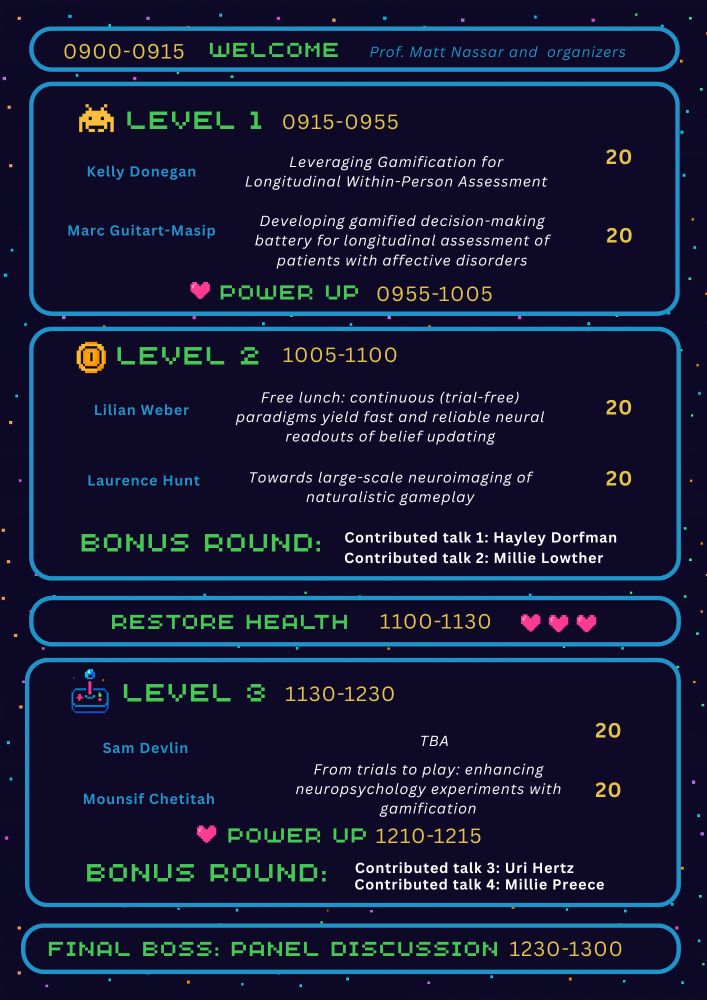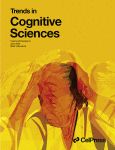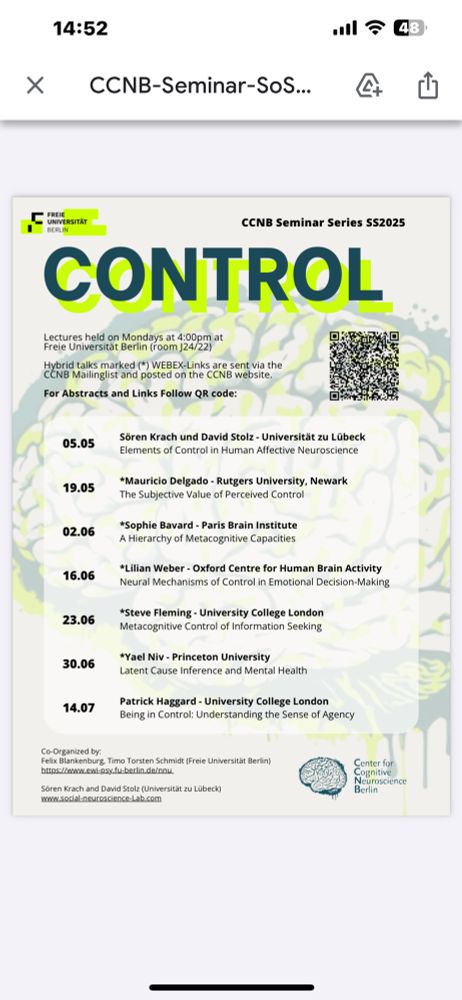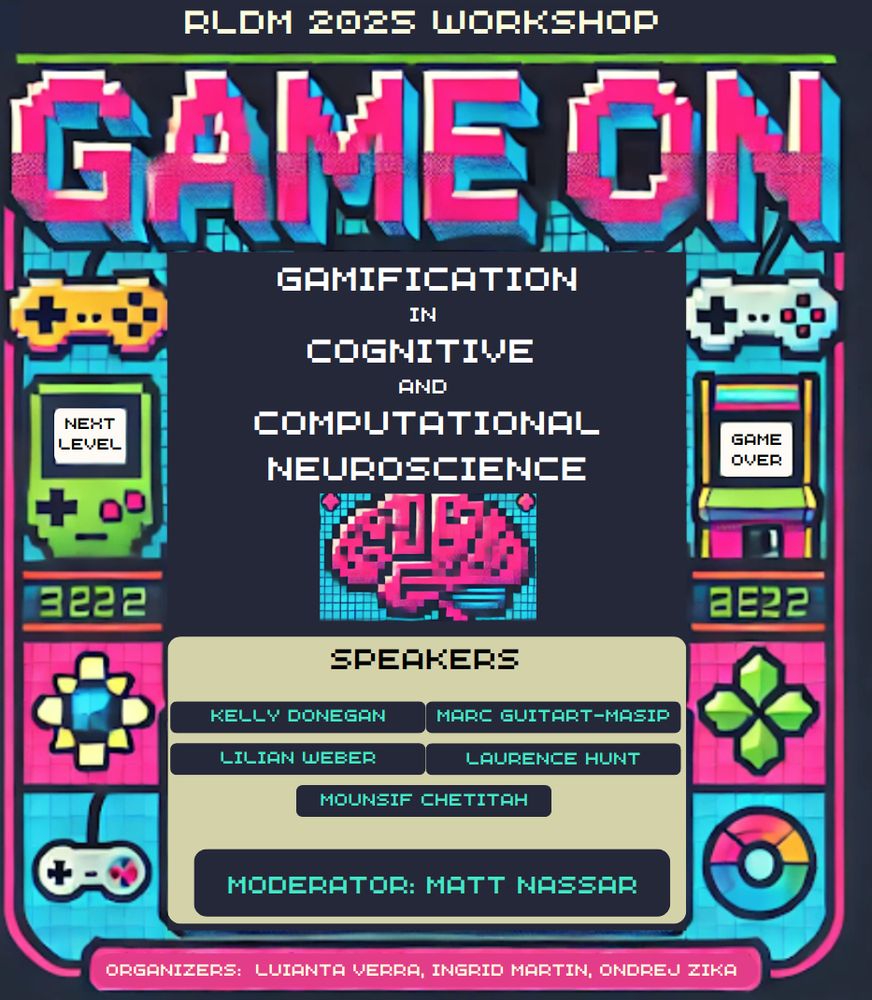
The gut-brain vagal axis governs mesolimbic dopamine dynamics and reward events
Gut-brain vagal signals gate dopamine ensembles, reshaping reward and motivation beyond a brain-centric view.
"These findings challenge the traditional brain-centric view of reward processing, supporting a more integrated model in which vagus-mediated interoceptive signals intrinsically shape motivation and reinforcement."
Awesome work by @peppeganga.bsky.social & his team 👏
www.science.org/doi/10.1126/...
31.01.2026 14:30 — 👍 36 🔁 16 💬 3 📌 0

🎉 My PhD work has just been published in @natcomms.nature.com!
How do we learn who caused what - and how much control we had - when outcomes depend on multiple people? We studied how humans do so using a new social learning task, computational modelling and fMRI.
www.nature.com/articles/s41...
🧵👇
21.01.2026 13:27 — 👍 50 🔁 19 💬 1 📌 2
🚀 Deadline for this is this Sunday! 🏃♀️
02.01.2026 09:40 — 👍 5 🔁 6 💬 0 📌 0
Research: Fachbereich Humanwissenschaften
We use cognitive & biophysical models, EEG, and transcranial ultrasound to study cognition in health and disease. A list of ongoing projects is here:
tinyurl.com/cogmodeltopics
The positions come with a lot of freedom to develop your own research agenda in this space. Any questions: Email or DM!
18.12.2025 14:57 — 👍 3 🔁 0 💬 0 📌 0
🚀 Excited to announce that I'm looking for people (PhD/Postdoc) to join my Cognitive Modelling group @uniosnabrueck.bsky.social.
If you want to join a genuinely curious, welcoming and inclusive community of Coxis, apply here:
tinyurl.com/coxijobs
Please RT - deadline is Jan 4‼️
18.12.2025 14:52 — 👍 76 🔁 54 💬 1 📌 5

A figure showing that non-invasive transcutaneous vagus nerve stimulation (tVNS) modulates Pavlovian bias in a state-dependent manner. A milkshake vs. water load reduces hunger and these changes are associated with the effects of tVNS on Pavlovian bias.
Last preprint 🎶(of the year).
If vagus nerve stimulation alters motivation by amplifying internal signals, then bodily states should matter. Using milkshake vs. water loads, we show that tVNS-induced changes in Pavlovian bias are dependent on hunger. #neuroskyence 🩺
www.biorxiv.org/content/10.6...
17.12.2025 07:24 — 👍 42 🔁 15 💬 1 📌 0
Important topic, state-of-the-art methods, cool city, caring supervisor - go for it people!
15.12.2025 07:22 — 👍 4 🔁 1 💬 1 📌 0
Thanks @cmdn-lab.bsky.social for discussions & dinner - I had a lovely time!
10.12.2025 10:08 — 👍 7 🔁 0 💬 0 📌 0
Come work with us!
21.11.2025 13:39 — 👍 9 🔁 3 💬 0 📌 0
Really excited about this 5-year project starting, funded by @wellcometrust.bsky.social, where we will combine ✨computational modelling✨ with causal intervention techniques such as ✨tFUS✨ to study the neurocognitive mechanisms of repetitive negative thoughts 🚀 led by @mikebrowning.bsky.social
21.11.2025 13:38 — 👍 22 🔁 4 💬 0 📌 0

A figure with 3 panels. Top: A plot of log-evidence for an experimental effect over peristimulus time, as inferred using vRSA. Bottom-left: a condition-by-condition matrix of regression parameters. Bottom-right: condition-by-condition matrix estimated by the vRSA model.
Do you like RSA analysis, M/EEG and Bayes? Then you'll love Variational RSA for M/EEG, by recently completed PhD student @alexlepauvre.bsky.social from Lucia Melloni's group. It's a method and SPM toolbox for multivariate analysis of M/EEG data. arxiv.org/pdf/2511.01784 . 🧵 [1/4]
06.11.2025 14:03 — 👍 50 🔁 17 💬 1 📌 2

Brain Injury During Focused Ultrasound Neuromodulation for Substance Use Disorder
A brain injury was reported in a trial using ultrasound, framed as low-intensity TUS. Kim Butts Pauly and I reviewed the case and disagreed with how it's presented. Key acoustic data are missing.
Case: doi.org/10.1016/j.br...
Letters: www.elsa-fouragnan.com/blog | web.stanford.edu/~kimbutts/Le...
03.11.2025 11:39 — 👍 50 🔁 23 💬 1 📌 4
Development of robust, single-subject markers of predictive inference for computational psychiatry
Looking for a PhD next year? Want to come and work on the next generation of OPM-MEG/EEG biomarkers in computational psychiatry?
Apply for our MRC iCase studentship with @mkflugge.bsky.social, collabs with @lilweb.bsky.social + industrial placement at P1Vital:
www.medsci.ox.ac.uk/study/gradua...
26.09.2025 10:11 — 👍 32 🔁 29 💬 1 📌 3

An interoceptive model of energy allostasis linking metabolic and mental health
Interactions between metabolic interoception and regulation may drive comorbidity between mental and metabolic ill-health.
What drives the bidirectional relationship between metabolic and mental ill-health?
Read our new metabolic psychiatry paper, “An interoceptive model of energy allostasis linking metabolic and mental health” www.science.org/doi/10.1126/... led by @saramehrhof.bsky.social @hugofleming.bsky.social
25.09.2025 09:48 — 👍 55 🔁 21 💬 5 📌 2

🚨 I am over the moon 🌓 to announce that I am joining University College Dublin @ucddublin.bsky.social as an Assistant Professor this fall to start the Uncertain Mind (UMI) lab 💫
I am looking for PhD/Postdoc candidates to join (more below 👇 ). Please RT as the deadline is pretty soon 🙏
24.09.2025 15:18 — 👍 142 🔁 36 💬 26 📌 5
These, and other, studies show that you can decode task-related signals from many brain areas.
But wouldn't we need causal manipulations to conclude that the brain "uses" them?
For example, maybe we can decode equally well from two areas. But, only one impacts behaviour when inactivated.
04.09.2025 15:11 — 👍 27 🔁 2 💬 3 📌 2
Couldn't agree more with this
27.08.2025 19:29 — 👍 3 🔁 0 💬 0 📌 0

New at the university: Prof. Weber!
Osnabrück University welcomes Prof. Dr. Lilian Weber! Since August 15, she has held the professorship "Cognitive Modeling" at the School of Human Sciences. A warm welcome!
In other news, I am now a ✨ COXI ✨ (cognitive scientist in Osnabrück, Germany)
www.uni-osnabrueck.de/en/campus-li...
I'll be looking for PhD students & postdocs later this year, so watch this space if combining cognitive modelling, EEG & tFUS to study flexible cognition sounds exciting to you 🚀
26.08.2025 13:07 — 👍 84 🔁 21 💬 12 📌 4
So proud of, and excited about, this project with the brilliant @johalgermissen.bsky.social, @mirunarascu.bsky.social, and @mkflugge.bsky.social + an amazing team of collaborators. Check out Johannes' summary thread 👇 #tFUS #amygdala
20.08.2025 08:06 — 👍 10 🔁 2 💬 0 📌 0
We are super excited about the first human transcranial ultrasound study from our lab which is now on BiorXiv, showing the amygdala‘s role in processing ambiguous emotions and showing TUS changed resting-state connectivity and metabolite concentrations (GABA) in the amygdala - a huge team effort! 🥳🙏🏼
20.08.2025 06:45 — 👍 38 🔁 8 💬 1 📌 2
Looking forward to this!
13.06.2025 13:40 — 👍 9 🔁 1 💬 0 📌 0

Are you coming to @rldmdublin2025.bsky.social #RLDM2025?
Join our workshop on Gamification in Computational and Cognitive Neuroscience with an amazing speaker lineup! 🎮👾🧠💫
w/ @ondrejzika.bsky.social @ingrdmrtn.bsky.social
10.06.2025 07:46 — 👍 13 🔁 6 💬 0 📌 4

The interoceptive origin of reinforcement learning
Rewards play a crucial role in sculpting all motivated behavior. Traditionally, research on reinforcement learning has centered on how rewards guide l…
For the past couple of years I met weekly with 3 amazing younger scientists @lilweb.bsky.social @debyee.bsky.social @rikepetzschner.bsky.social to share ideas and teach each other. No agenda. It was often the favorite part of my week. Then we started writing. www.sciencedirect.com/science/arti...
11.06.2025 06:06 — 👍 17 🔁 6 💬 0 📌 2
Re-posting is appreciated: We have a fully funded PhD position in CMC lab @cmc-lab.bsky.social (at @tudresden_de). You can use forms.gle/qiAv5NZ871kv... to send your application and find more information. Deadline is April 30. Find more about CMC lab: cmclab.org and email me if you have questions.
20.02.2025 14:50 — 👍 77 🔁 89 💬 3 📌 8
Two days left for contributed talks submissions 🤖💫
sites.google.com/view/game-on...
28.04.2025 14:58 — 👍 7 🔁 5 💬 0 📌 0
OSF
so, so excited to share our new theory which endeavours to answer why depression and poor metabolic health go hand-in-hand: "An interoceptive model of energy allostasis linking metabolic and mental health" 💪🧠🔋 @saramehrhof.bsky.social
@hugofleming.bsky.social
osf.io/preprints/ps...
28.04.2025 09:42 — 👍 80 🔁 35 💬 1 📌 0

📣 Exciting announcement for the summer term:
Starting in May, the @ccnberlin.bsky.social seminar series by Felix Blankenburg & Timo Schmidt (FU Berlin) is co-hosted by @david-s-stolz.bsky.social David Stolz (Universtiät Lübeck) and myself.
The topic of all talks is: "CONTROL"
15.04.2025 13:07 — 👍 24 🔁 10 💬 1 📌 0

🚨💫🤖 RLDM Workshop announcement:
"Game on: Leveraging Gamification in Cognitive and Computational Neuroscience"
Contributed talks submissions now OPEN: shorturl.at/0p0Jd
Looking forward to seeing you in Dublin!
w/ @luiantaverra.bsky.social & @ingrdmrtn.bsky.social
21.02.2025 10:12 — 👍 29 🔁 13 💬 2 📌 2
Interesting paper from Millridge et al: Reward Bases: A simple mechanism for adaptive acquisition of multiple reward types
Do DA neurons encode gradient of reward dimensions, i.e some encode food predicting cues, others fluid etc.?
journals.plos.org/ploscompbiol...
#compneurosky #neuroskyence
26.11.2024 08:57 — 👍 8 🔁 4 💬 1 📌 0
Neuro-AI Postdoc @ MPI Biological Cybernetics. Previously @Harvard, A*STAR & NUS. 🇸🇬
CloudResearch is the leading participant-sourcing platform for quality research projects. Fast. Affordable. Accurate.
Computation & Complexity | AI Interpretability | Meta-theory | Computational Cognitive Science
https://fedeadolfi.github.io
On the job market!
Professor of biological psychology
@unigreifswald.bsky.social. Member @jungeakademie.bsky.social.
https://psychologie.uni-greifswald.de/43051/biologische-psychologie/prof-dr-jakub-limanowski/
Assistant Professor and Lab Lead of Cognitive Network Modelling cognemo.com
@CAMHResearch
#KrembilNeuroinformatics. Computational psychiatry
Professeur (PU-PH) de Psychiatrie à l'Université Paris Cité. Mes messages n'engagent que moi.
https://www.monanalyse.fr/fabien-vinckier-n201.html
Researcher, decision-making and metacognition.
Postdoctoral Researcher at the Princeton Social Neuroscience Lab
Incoming Assistant Professor at Texas A&M - 2026
https://coupled-minds.github.io/
The Center for Mind & Cognition (CMC) is an interdisciplinary platform at #RuhrUniBochum. We investigate the exciting nature of the mind and its (neuro-)cognitive processes.
Visit us at: https://philosophy-cognition.com/cmc
Cognitive Neuroscience/Lazy Violinist
Interested in Computational modeling، neuroimaging and neurostimulation
Postdoc @ Princeton AI Lab
Natural and Artificial Minds
Prev: PhD @ Brown, MIT FutureTech
Website: https://annatsv.github.io/
Cognitive & Mental Health Researcher 🧠
Post-doc @ University of York | PhD @ Trinity College Dublin
➡️ https://sites.google.com/view/kellyrdonegan
Exploring how the brain uses specialized knowledge in domain-general cognition.
NeuroSPACE unites 4 labs led by @hansopdebeeck.bsky.social, @bertdesmedt.bsky.social, @kobedesender.bsky.social & @neuropsylab.bsky.social.
🌐 ppw.kuleuven.be/neurospace
I am your average Mediterranean computational neuroscientist 🧠. Antifascista per scelta e per necessità. There are few things more political than science.
Cognitive neuroscientists | Schuck lab @mpib_berlin | queer scientist 🏳️🌈 | currently into task representations in the 🧠 (NaN/NaN)
Postdoctoral Researcher at Universität Hamburg
PhD in Cognitive Neuroscience🧠 | Latin Dancer🎀 | Swimming💦 & Badminton🏸 enthusiast | UCL Research Fellow
Across many scientific disciplines, researchers in the Bernstein Network connect experimental approaches with theoretical models to explore brain function.
Schriftsteller divreser Werke!
Computational & Systems Neuroscience (COSYNE) Conference
🧠🧠🧠
Next: Mar 27-April 1 2025, Montreal/Tremblant
🧠🧠🧠
Here too:
@CosyneMeeting@neuromatch.social
@CosyneMeeting on Twitter












